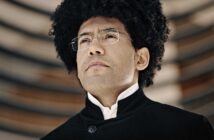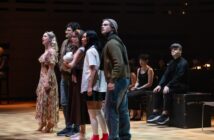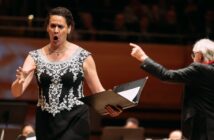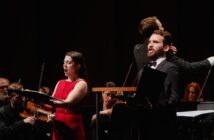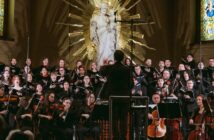Berlioz: Roman Carnival Overture
Ravel: Shéhérazade
Lalo: Le Roi d’Ys “De tous côtés j’aperçois dans la plaine”
Saint-Saens: Samson et Dalila “Mon Coeur s’ouvre à ta voix”
Lalo: Le Roi d’Ys “De tous côtés j’aperçois dans la plaine”
Saint-Saens: Samson et Dalila “Mon Coeur s’ouvre à ta voix”
Saint-Saens: Samson et Dalila “Bacchanale”
Bizet: Carmen “Près des remparts de Séville” (Seguidilla)
Bizet: Carmen “L’amour est un oiseau rebelle” (Habanera)
Ravel: La Valse
Denyce Graves, mezzo-soprano
Austin Symphony Orchestra/Peter Bay, conductor
Long Center
Austin, Texas
Friday, March 2, 2012
Austin, Texas
Friday, March 2, 2012
What does it take for a young singer to make it to the stage of the Metropolitan Opera? What does it take to triumph in leading roles with colleagues like Placido Domingo and James Levine? Having achieved all that, what does it take to stay there at the height of operatic superstardom?
In the 1990s, Denyce Graves (photo: right) was the Carmen and Delilah of choice at the Met and all indications were that she had an even bigger career ahead of her, but this was not to be. She suffered through several destructive relationships, one of which destroyed her marriage of 15 years; she had an emotional breakdown; she was experiencing health issues with her vocal cords, and finally, for a time, she lost her voice altogether. But with personal courage and the strength of her marriage in 2009 to Dr. Robert Montgomery, now Chief of Transplant Surgery at Johns Hopkins Medical Center, Denyce Graves has resumed her career. Her current calendar doesn’t include dates at the Met, but she is busy performing all around the world.
In Austin, on this night, Graves gave us some of the music which catapulted her to fame – arias from Carmen and Samson et Dalila – but also the much more sophisticated Shéhérazade by Maurice Ravel. While she charmed the audience with the Bizet and Saint-Saens, for me the highlight of the evening was the Ravel. With conductor Peter Bay teasing exquisite phrasing and sonorities out of the Austin Symphony, Graves gave a virtual master class in vocal artistry. Her singing here was sensual but subtle and beautifully nuanced – a far cry from the earthy style of the Carmen excerpts she was to sing later.
My guess is that those in the audience unfamiliar with the text of the three songs, which have enormously long and detailed texts by Tristan Klingsor, got very little out of Shéhérazade except the beauty of Graves’ voice. The texts were provided with the programme; unfortunately, with the house lights down no one could possibly read them!
With today’s technology, the ideal way to present vocal music with important text is by means of surtitles. Surtitles are used in nearly every opera house in the world and should be routine in concert halls as well, not only as a courtesy, but also as a means to engage and build audiences.
Given Denyce Graves’ choice of repertoire, Maestro Peter Bay decided to make this concert an all-French programme, opening with the familiar Roman Carnival Overture by Berlioz, which in this instance, apart from a beautifully-played English horn solo, lacked power and urgency. Part of the problem may have been my location. Seated in the rear of the mezzanine, I found the playing of the Austin Symphony had clarity, but not much presence.
The evening concluded with Ravel’s La Valse. Again, the thousands of wondrous details in the score emerged with admirable clarity but the climaxes seemed half-hearted, at best. The fantastic tam-tam effect scarcely registered at all. This complex score is not easy to put together on limited rehearsal time; Bay may have been happy just to keep it together. Perhaps opening night nervousness was partly to blame. Hopefully, the build-up to climaxes in the second night’s performance had more substance and impact.
Paul Robinson is the author of Herbert von Karajan: the Maestro as Superstar, and Sir Georg Solti: His Life and Music. For friends: The Art of the Conductor podcast, “Classical Airs.”
Peter Bay: Photo by Marita




